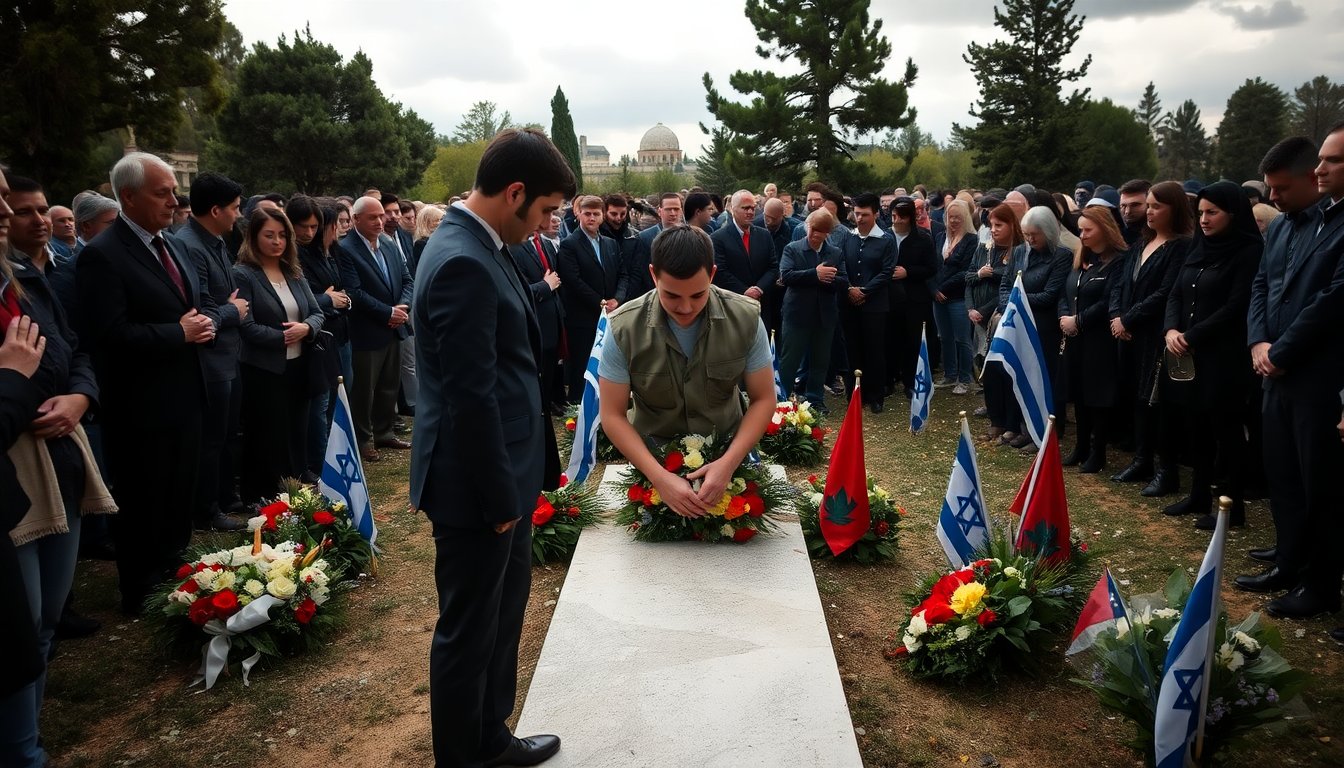Table of Contents
In a profound display of grief and solidarity, two recently released hostages gathered at a Jerusalem cemetery to honor a fallen comrade. Matan Angrest, who returned to Israel just two days earlier, stood solemnly at the grave of his commander, Capt. Daniel Peretz, who was only 22 years old at the time of his death. Surrounded by hundreds of mourners, Angrest reflected on the sacrifices made by his unit during the tragic events of October 7, when a devastating attack by Hamas led to the deaths of over 1,200 people and the abduction of 251 individuals.
With deep emotion, Angrest prayed for the safe return of his fellow soldier, Sgt. Itay Chen, whose body remains missing in Gaza. “I wish he could come back. I’m ready to go to Gaza to bring him back,” Angrest stated, his voice steady despite the visible toll the ordeal has taken on him.
The complexity of mourning in Jewish tradition
Under the ceasefire agreement, Hamas is required to return the bodies of deceased hostages. However, as of early Thursday, only 10 out of 28 bodies have been returned, leaving many families in a prolonged state of anguish. This uncertainty is especially devastating within the context of Jewish traditions surrounding death, where burial is regarded as a sacred duty. Rabbi Benny Lau, a close friend of the Peretz family, emphasized this belief, stating, “This is our obligation to God; we take the body and return it to the land.” In Judaism, physical remains are treated with profound respect, as the body is seen as a vessel that must be cared for even after death.
The urgency of burial rites
Jewish law mandates that funerals occur within 24 hours of death, involving cleansing rituals and specific prayers. Sharon Laufer, a volunteer with burial societies, emphasized the importance of these customs: “Until the body is put in the ground, the soul is not complete, and that’s why it’s so important to us.” This urgency holds profound significance for families of hostages, who are actively advocating for the return of their loved ones’ remains.
Living in uncertainty
While the nation celebrated the release of living hostages earlier this week, many families experienced a profound sense of betrayal upon learning that the crisis had concluded. Itay Chen, who was only 19 at the time of his abduction, was initially captured while fulfilling his military duties—having switched weekends with a fellow soldier to attend his brother’s bar mitzvah. Two years later, his family continues to confront the harsh reality of his disappearance. “It’s a bizarre feeling where you start the day anticipating the worst phone call of your life, and then feel disappointed when that call does not come,” expressed his father, Ruby Chen, highlighting the emotional turmoil that accompanies such uncertainty.
Amid the grief, many gathered in Tel Aviv to honor those who lost their lives. Shlomit Grouda, standing alongside fellow mourners, articulated her conflicting feelings: “I fought for them to come home, and while I felt joy for those who returned alive, it is now time to bow our heads for those who didn’t.”
Finding closure through rituals
Families like that of Tal Haimi, who left his home to protect his community during the attack, confront the painful reality of uncertainty regarding their loved ones. After receiving the devastating news that his remains were believed to be in Gaza, Haimi remarked, “I think he deserves this honor. He went out first, knowing I was alone with the kids among terrorists, to protect us. And he did.”
Rituals surrounding death in Judaism play a crucial role in the mourning process, enabling families to navigate their grief and pay tribute to their loved ones. Rabbi Mijael Even David highlighted the significance of these practices, stating, “We need to give them the time and the possibility to move from the terrible uncertainty to learning to live with the reality that the person is no longer there.”
During her poignant eulogy at Peretz’s funeral, his sister, Adina Peretz, conveyed her profound sorrow while finding comfort in the presence of her brother once more. “You can finally rest in the Holy Land,” she expressed, as the community came together to commemorate his life. The service, attended by family, friends, and dignitaries, featured heartfelt remarks from Shelley Peretz, his mother, who found solace in the knowledge that her son had returned home. “We have you home now where you belong,” she stated.


